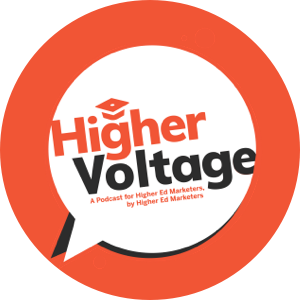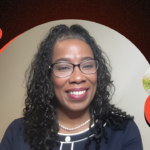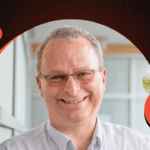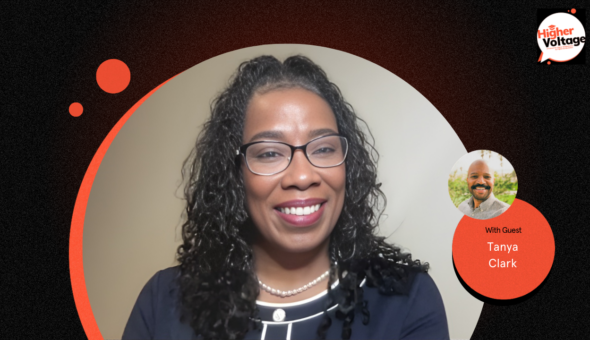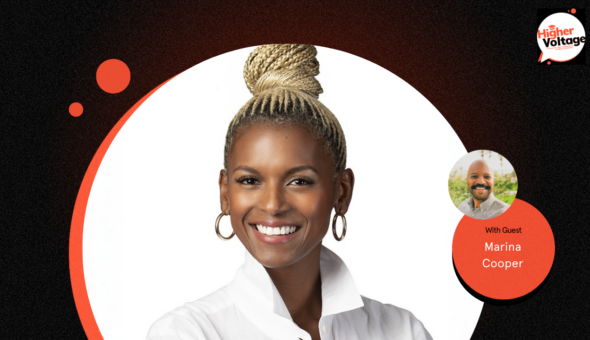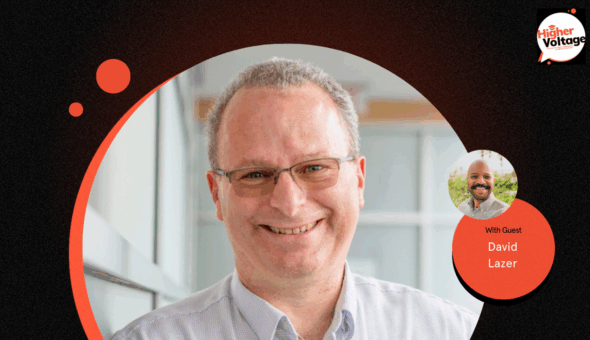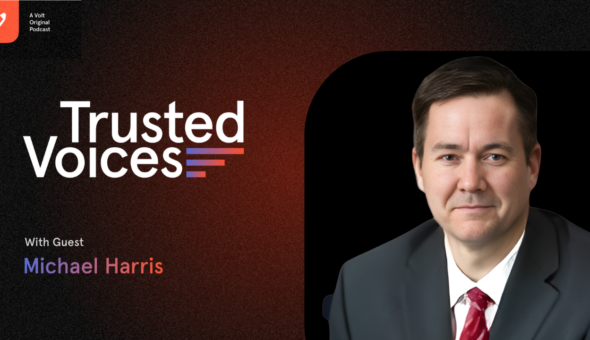Higher education is at a turning point, and the key to its future isn’t just delivering quality education—it’s fostering quality learning. In this episode of Higher Voltage, host Kevin Tyler speaks with Scott Marshall, CEO of Semester at Sea, about why institutions must move beyond the traditional “sage-on-a-stage” model and embrace an ongoing, dynamic learning experience for both students and faculty. From experiential learning to industry collaboration, Marshall highlights the shifts needed to ensure higher education remains relevant, impactful, and student-centered.
Show Notes
Discussion Points
- Critical thinking: Creating Job-Proof Skills for the Future of Work
- The Importance of Critical Thinking Skills for Students and Ourselves
Read the full transcript here
EK ad read
Kevin Tyler
Hello, hello everyone. Welcome back to Higher Voltage. I am pleased to have Scott Marshall from Semester at Sea join me today. Before joining Semester at Sea, which is also known as ISE, Institute for Shipboard Education, which is the nonprofit that runs Semester at Sea, Scott was a professor of management at Portland State University. While at PSU, Scott held numerous leadership roles, led study abroad programs to Asia and the Middle East and taught short courses in a wide range of countries such as Cambodia, Colombia, Russia, and Serbia. His lifelong commitment to global education and travel was born out of a study abroad program in Japan as an undergraduate. Outside of his work, Scott is happiest hanging out with his family and friends and spending time outdoors and planning the next grand adventure. As a fellow traveler myself, I am so pleased to welcome Scott Marshall to the show. How are you?
Scott Marshall
Kevin, I’m doing really well. Thanks so much for having me join you today. I’m really excited.
Kevin Tyler
Of course, of course. So our topic for today is essentially re-imagining quality education in higher education. I feel fortunate for Higher Voltage to get, kind of, a lot of emails offering guests to come on the show to talk about a variety of different topics. And one of those was reimagining quality education, essentially around how institutions can move beyond traditional measures to foster adaptability and critical thinking and global awareness. And I’m really intrigued by your perspective, especially as a global traveler and global educator through your role at Semester at Sea on what that means to you in our current state in higher ed today.
Scott Marshall
There’s a lot of ways to answer that question, Kevin, for sure. I’m actually going to steal a bit from one of your previous guests as a start point. You had John Comerford on not too long ago, right?
Kevin Tyler
Yes.
Scott Marshall
A really thoughtful president of Otterbein University. One of the opinions or statements that he made was higher ed seems to do a great job of measuring what it looks like when people enter, but does a horrible job of measuring what it looks like after or as an outcome. And I fundamentally agree with that. It is a method, an approach that is institutionalized and very hard to overcome, but it is one of the fundamental limits of what we are doing in higher ed. Certainly, accredited agencies are pushing learning outcomes and we established rubrics, assessment rubrics, for understanding what learning is going on. But fundamentally, we are still not looking at what quality looks like in the learning experience.
So that leads into my second point that I would prefer myself to call what we do in higher education as learning, not educating. And the reason I would use that term is because educating has this very old idea that we have knowledge that we are imparting, rather than we are all learning. The individual who may be standing in front of the classroom and those who are seated are all learning. And that is a really important framing.
So sometimes people do talk about higher ed learning. Perhaps that’s the term we should start to consider. But certainly, I think we need to move past the idea of educating and more thinking about learning.
My third thought on this really goes to the choice I made, which is to leave an institution and work for a nonprofit that focuses on global education. Within this global education, fundamentally underlying it in my mind is experiential learning. And I certainly grew up within a tiered classroom in the front, you know, a standard textbook, a certain number of contact hours, sort of that informal contract called syllabus, delivering lectures. So I have that experience. I soon learned that students will be more engaged learners, as will I be, if I start to bring guest speakers in, if I start to get them out of the classroom into businesses, into nonprofits, if I start to have them do simulations and write case studies, not just read them, but write them.
So it is all of this importance around experiential learning as part of the learning process that I think has to be embedded in all of our learning enterprises. So we have to do a better job understanding what is quality at the outcome end. We have to really make sure experiential learning is part of it. And the second point I made is we need to focus on really co-learning, not educate. There’s a lot there that we can dive into, but that’s what I would just offer initially.
Kevin Tyler
So, I’m curious how do you define quality education?
Scott Marshall
Yeah, so I again would say it has to be learning. It has to be learning, not educating. And I do think there is a difference. So let me give you a contrast to sort of illustrate what it is. Again, I was in a business school within an institution for 18, 19 years. I know what it’s like to teach in a classroom. I also know what it’s like to take students overseas. I know what it’s like to have students engage with local entrepreneurs to write case studies. And I also know what it’s like to be a faculty member on a Semester at Sea voyage.
And one of the reasons I opted to leave my tenured full professor position and jump into this little nonprofit is because I knew as a faculty member, I was engaged in a learning process with the students on Semester at Sea. And what power that has for faculty as they go back to their campuses and become co-learners with their students, not simply educators delivering their wisdom. And while, Semester at Sea, you know, I hold up as a very good model, I think there’s a lot of models that are like that.
Our academic partner, Colorado State University, has a Mountain Campus in which students go up there to take educational courses that are learning experiences. There certainly are articles they’re reading. There are certainly textbooks they have to reference, but they’re in their element and they’re moving themselves outside to build that learning environment, to really embrace that learning experience. So I think we have to take people out of the Ivy walls and really make it a learning experience, which means it can’t be just textbooks. It can’t just be PowerPoint. It can’t just be standing to deliver sage on a stage. We are trying to create productive citizens of the world who are good thinkers. And I’m sorry. This is both from my ISE and my personal view, that cannot be done in textbook alone. It just can’t.
Kevin Tyler
I can’t agree with you more. You know, as you’re speaking, I think about some of the campuses that have taken on innovating the educational experience or the learning experience. The Colorado colleges of the world with their block scheduling system and how they kind of immerse people in different coursework. And then also thinking about how long education and learning has been around and how much it has not evolved and the way that it is delivered. And so you’re talking to a person who firmly believes in the evolution of a learning experience is quite important because the things that we have to learn about are very different than what we were learning about when this was all kind of stood up. So I hear you 100%. Are there other examples or impactful ways that you might advise or suggest higher education to imagine what quality learning might look like. I’m going to start using learning instead of education for this conversation because I like that.
Scott Marshall
Well, you know what’s nice about the name of your podcast, is you call it Higher Voltage. You didn’t call it higher education.
Kevin Tyler
Exactly.
Scott Marshall
You can pivot right here. Right? You can pivot to the learning. So if I could, I actually would go into a part of the overall learning experience that is not in higher ed or higher learning or in my area but really the K-12 experience. You start to see students, the outdoor ed, I’m a fan, but it’s a broken model as well. But when you have students who are basically required to do multiple different types of activities that push them out of their comfort zone as part of the curriculum, that’s where the learning and growth happens. Simple example, there are middle schools who require their students to do music or art, require, all three years or all two years, depending on the, require them to take a language and require them to do outdoor ed.
So if you think about that beyond the three Rs that we traditionally measure, people’s competency and the quality of the education. Someone’s learning something about music, they may not be a savant, but they’re forced to take on artistic expression in some form. They’re forced to start to understand the world a bit through the lens of basic foreign language. They’re forced to get outdoors and see the world through a whole different lens.
So even those, what may seem like simple things, actually I think have a profound impact on that age group. And I think we do this justice to our young people when really what they measure them on is can they read, can they write, can they add and subtract? Not that they shouldn’t be able to do those things, but let’s be clear, those don’t necessarily require great problem solving skills, great critical thinking skills, great innovation skills and creativity. It’s all these other things that really create synoptic connections that allow people to be creators, to be innovators, to be problem solvers. So rather than go to the higher learning part of our life, let’s go back to the basics of K-12 and what we’re lacking as essential parts of the experience.
Kevin Tyler
Plus one, again, on that. I’m the beneficiary of a lot of extracurricular learning through my family and exposure that they provided me as a child. My middle school year is six through eight. And all of my education from K through 12 in Columbus, Ohio, was through the alternative school system. And depending on where you live, that could mean something else. But in Columbus, it was just magnet schools or lottery schools. Whereas on the East Coast, that’s for, you know, more behaviorally challenged students.
But in my experience, my middle school, you were required to take a language. We had six options, and it was Russian, German, Italian, Spanish, French and Latin. I got stuck with Latin only because I was late with my form and I cannot tell you how grateful I am to have had three years of Latin at that age because my comprehension when I’m reading is so much greater, just these natural connections are made though it’s a dead language. There is familiarity with what I’m reading because of that. And so when we have educational experiences or learning experiences that feel immersive and different and thoughtful and respond to how the world is changing, I think we have a better opportunity for all different kinds of success. If we are given information in the same way without regard to how people are learning it or absorbing it, we might not know what success could look like because we’re not giving options.
The other part about this, I think that’s interesting in that some of the points that you raise is like some of this exposure, some of these experiences can only be had if you have high income, right? Like if you aren’t getting it at school, you can only get it through essentially wealth. And so how do we start to think about the K-12 experience in a way that doesn’t require so much money, but can still offer the same kind of outcomes?
Scott Marshall
Yeah, it is a significant expense. And I want to go back to two words or frames that you use. You said extracurricular. So it goes to your household, your parents ensuring you had those. And how do we turn it into curricular rather than extracurricular, right?
Kevin Tyler
Exactly.
Scott Marshall
Part of your question. The second thing you talked about alternative schools, alternative options. And if we embed these other elements, and make them curricular rather than extracurricular, then my hypothesis, my hypothesis, that would need to be tested, is that we would need fewer alternative options because people whose proclivity is more to the arts or other, what we now classify as extracurricular, would find a place within the K-12 system. When it’s rote learning, three Rs, there is not a place for everybody. And so if they’re struggling because they haven’t found their thing, well, we’ll put them into the alternative system, which I’m sorry, is a flaw in it all.
One of the beauties, I think, of much of higher ed still, I can be a critic of many things, but I will tell you one of the things I think is still brilliant, and I hope higher ed as an industry holds to it, is the Gen Ed model, that those first two years are really exploratory. A mistake we make oftentimes for graduating high school seniors, so what are you going to major in? Right? No, please don’t ask them that. Ask them, hey, what’s going to be interesting for you in that first two years? What are you going to sign up for in that first year at the university, if you’re going to go, that just will be interesting and stretch your thinking?
So the Gen Ed mile is to me something that higher ed is struggling to maintain. And certainly some degrees actually have intruded down into Gen Ed, which I think is a problem. So again, the model I think works in many regards, but we need to find a way that everybody can find their expression within K through 12 and through the higher learning process.
Kevin Tyler
Yeah, I think that you’re raising some really interesting points that, you know, all these fireworks in my brain are going off. One around obviously the standardized testing part of the K through 12 experience, which kind of tamps down any sort of kind of creativity that people might want to inject into the learning experience. And also this idea that around gen ed, right? Like I think we are thinking about or talking about in higher education, especially around the cost of things. And then gen ed is typically one of the first things that people point to. Like I don’t want to, I don’t need to learn about that anymore because I can either do it on TikTok or learn it somewhere else. It’s increasing how much I have to pay into the system that I might not value or trust already. It’s just going to lengthen my time here. How canI lock those gen eds off and just get to my major or get to my specialty?
And so the questions that you’re raising or the points that you’re raising are raising a bunch of questions as well in my head about how we even get to this. It’s becoming more of a thicket in my brain in terms of figuring out the solutions.
Scott Marshall
Well, you’ve thought a lot about marketing, obviously, in higher ed and let’s go with higher learning. And I would tell you, I think the industry has done a really poor job explaining the essential nature of the gen ed experience. Just calling it gen ed is a terrible tagline.
Kevin Tyler
I agree.
Scott Marshall
It’s what I have, right? And some institutions have come up with their, this is the first year experience. This is, you know, they have different names for it. But as an industry, it’s done an extraordinarily poor job, in my opinion, of really articulating the importance of that, societally. Why would we do it this way? Why would we have a four-year adulting process that includes two years of exploration of disciplines and ideas? Well, let’s find a way to articulate that much clearer.
Kevin Tyler
Yeah.
Scott Marshall
And I don’t have the answer for you, I gotta be honest. I’m not a marketing guy, but can we employ the marketeers to really capture the essence of that and communicate it?
Kevin Tyler
Listen, Scott, you can’t come on here without any answers. You have to solve everything in the next hour.
But I think you’re right. I think that there is a marketing play here, of course, obviously, in the way that the stories are told. But the stories can only come out of the experience that’s being built for the people who are there by the institution. I think back on the literally hundreds of college campuses I’ve been on and the work that I’ve done in higher education marketing, that I’m very proud to have seen so many different kinds of ways learning can happen.
But in terms of innovation, I can only think of a few that are actually like revamping or repositioning what learning looks like on their campus. We talked about Colorado College already. Hartwick College in New York is a really great example of how they’ve reframed or restructured their learning experience around the needs of their audience, very specific needs. There are others across the country, but I’m wondering if you know of any examples that you can point to that have already started this work, this heavy lifting work of re-imagining what quality learning looks like.
Scott Marshall
Well, I know a university that’s abandoning it.
Kevin Tyler
Oh, wow. Well, all right. I’m here for the tea. Like, come on.
Scott Marshall
Well, it just indicates the pressures on institutions politically, socially, financially. And the opposite part of there is not a sufficient marketing story here about the bio of this work. I’m not sure if I should name the institution. I just know that they’ve cut most of the faculty from that core part of the gen ed experience that was designed over two decades ago. This is extraordinarily powerful and what it can deliver by capturing that value and communicating it, so that administrators, politicians, taxpayers see that as truly essential. It’s a challenge right now. There’s no doubt. And of course, in our current climate with research funding being threatened and administrators truly scrambling to figure out what this environment’s gonna do to their budget.
Kevin Tyler
Yeah.
Scott Marshall
I don’t just think about what’s happening now. I think about the long-term impacts and we can talk about what it means for Gen Ed because Gen Ed is an easy target as we know we want practical degrees.
Kevin Tyler
Right.
Scott Marshall
I can cite so many examples of people who graduated with apparently impractical degrees who went on to do extraordinary successful careers. But have we captured that? Have we told those stories effectively? You are in the marketing area. You probably have seen those great stories. I have not seen where the national press is saying, look, we have to value this because apolitically, apolitically this is the right thing for the country.
Kevin Tyler
Yeah. Yeah, I think about how, and I had this similar conversation recently with a guest around when I got into higher education marketing, the focus was marketing the school. And then it became marketing the school and the value of going to college. And now it’s a whole other conversation that’s being had, right? We’re moving from transforming how we think to merely a transaction, right? And that is what it feels like it is becoming, has become. And there is so much great value to be had from a learning experience that is immersive, that is thoughtful, that is compelling and comprehensive. And we’re looking at or assessing the higher ed, higher learning experience from a transactional lens and it will never live up to the expectations of a transaction.
And so when you think about when we talk about things like critical thinking that might not just come from a specialty course. It might need to come from humanities and whatever else. And so I’m excited about this conversation because when we think about innovation and education and learning, it often comes from things like tech and not the experience.
Scott Marshall
Gosh, there’s a lot within what you just shared. So gosh, there’s so many ways to riff off your insights here. First of all, what is that four to six year experience post high school that 35 to 40% of American adults take on? What is that? What’s the purpose of it? And to your point, we didn’t necessarily frame it with clear outcomes, but it was about transformation from pre-adult to adult. It was something we were trying to accomplish and something we continue to try to accomplish, which is taking an 18 year old who got themselves through high school. And we want them to become well-functioning, thoughtful citizens who can solve problems and higher learning four to six years is a way to accomplish that. But that’s not a marketing pitch.
Kevin Tyler
Right. Right. No, it’s not.
Scott Marshall
See, I’m not a marketer. I told you, Kevin.
Kevin Tyler
You know it’s not marketing, so you might be.
Scott Marshall
How do you bring that down into the right kind of story so people understand it and they invest in it? And if I could just go to where I work now, I mean, I made this switch because I think that three and a half months of experience that we provide is that kind of profound experience that is part of that transformation from pre-adult to adult. It’s a community, it’s experiential. It’s joint learning. It is comparative across cultures and countries. Within a three and a half months period, the vast majority of those participants will change in ways that their parents simply won’t recognize them in terms of their presence because they have become closer to that adult that they, as parents, most likely were seeking.
Now, this is one way that 105 days can be part of that journey. But we need all of the industry to make a shift, to try to tell the story so that people understand this is that pivotal four years, four to six years, right? This is that time. We need to value it. That doesn’t mean there can’t be a whole another percent of people who choose not to go. Of course. But that doesn’t mean we shouldn’t continue to have 35 to 40% of population going through this process as well.
Kevin Tyler
Right. Right.
TVP ad read
Kevin Tyler
What do you think might be some of the main obstacles institutions might encounter when they want to reimagine what quality learning looks like?
Scott Marshall
Oh, boy. Yeah, let’s dig into it. Let’s start on the very practical side. State and federal funding has decreased substantially over the past number of decades, and costs have gone up. And I understand you can look at the data in one way and say, it’s because of administrative costs. But let’s be clear, inflationary pressures across the board have driven the pressures upward on costs and overhead. And if state and federal funding are going down, then your revenue base is going down. So then you have to go into a tuition and market play and that costs money and that’s a hyper competitive game. And so in that environment, in many industries, what you’ll see is rapid, quick, innovation to stay real and lots of differentiation.
The industry we’re talking about, the higher learning industry is set up to not move quickly, to not innovate. It’s set up to be homogenous, quite monolithic. And that’s not to blame the administrators who are now running the industries. This has been 50, 60 years in the making, if not longer. Could be even over a century ago when, you know, some of the New England schools were set up and people started to clock time rather than quality of learning. They continued to the sage on the stage model. So you can go back to the late 19th century to see the origins of it.
And, you know, the institutions have very high fixed costs, both on the infrastructure side and on the faculty side. So an organization that revenue went down because of federal and state funding decreases, whose cost pressures continue to rise and whose fixed costs are rigid. You’re in a tough spot.
Kevin Tyler
Yeah.
Scott Marshall
So there’s a reason why an institution like Arizona State has been rated number one in innovation because there’s been this cultural transformation of how do we constantly innovate around the learning experience and how do we at the same time grow and at the same time become a Carnegie One research institution. We don’t have to sacrifice high quality rigorous research for the access mission. And there’s a downside to some of the work at ASU for sure, but it does set an example of how you can increase access, how you can innovate around not just the edges but at the core and still be a rigorous research institution.
Kevin Tyler
It’s not either or. Yeah, I agree with that. I think that I’m really excited about some of the, I guess what I would call softening of the ground between institutions inside of higher education. I think that we’ve all come up with this competitive mindset around like, I just want to tell a better story or have better outcomes than the school down the street. But what seems to be the conversation or it seems the conversation is evolving into recently is this idea that we are all in this together and we should be helping each other lift up and amplify the reputation of all of our institutions and not one over the other. There will always be a hierarchy inside of any kind of system. Higher ed is not excluded from that. But these efforts that are happening in Utah, that are happening in Idaho, that are happening in Tennessee around like schools essentially reaching across municipalities to say, hey, what are you doing over there? Let’s pitch in on this campaign to help re-educate the state why it’s good to have colleges here. And I think that’s one of the kind of first steps into getting into all of the things that we’re talking about now. If people don’t understand the value, then we can’t change the thing because it won’t be valuable to.
Scott Marshall
Yeah. Yeah, and you have much more insight into the collaborative efforts. I’m glad to hear from you that more of that is happening. The challenges I suppose some of them face still is I’m a ute, I’m a vandal, I’m a ram, I’m a cowboy, you know, I’m this. And the donor community is like, I’m giving because I’m an alum from this program, I’m buff or whatever, right?
Kevin Tyler
Right.
Scott Marshall
And I’m none of those things so I can throw them out. But I think we have to give up some of that ego to really thrive. We have to find ways and it’s not just, we’re gonna do a joint degree.
Kevin Tyler
Right, right, right, right.
Scott Marshall
Those will fall apart the minute the money’s not there. Let’s be honest, those are really hard.
You actually have to start to integrate efforts. Again, I think you’re saying this more than I am, but you’ve got to truly partner to have the industry thrive in the long term.
Kevin Tyler
I couldn’t agree with you more. What advice might you give listeners who want to start this conversation on their campuses and like where might they start when thinking about re-imagining quality learning on their campus?
Scott Marshall
Yeah, you know, I would wait until this storm has passed.
Kevin Tyler
Yeah, fair. I’m only laughing to keep from crying, but yes, please continue.
Scott Marshall
Yeah, there’s administrators, faculty, staff on campuses are really, of course, overwhelmed by the current environment and trying to sort out what it means for them, so. But it may be that pause or period to come up with the right ideas, right? Maybe someone can sit and really come up with that. So I think there’s a number of ways to do it. And, you know, my previous life within academics, I failed and succeeded and failed and succeeded and failed and succeeded at trying to innovate within the system. So of course, my deepest lessons came from those failures. But I can tell you there’s definitely ways to work within the faculty governance model to innovate relatively quickly.
First of all, you’ve got to go talk to industry. It’s not that you go talk to them and tell them I’m going to do exactly what you say. But out in, and I say broadly industry, and I don’t mean just the for-profit corporate sector, I also mean the NGO sector and the public sector, go out and understand the landscape and start to decipher what those emerging needs are that connect to your own discipline and interests and passions. Okay, so you’re going to get this future orientation through those conversations. They’re unlikely to happen if you stay within the four walls of the university. Again, not a critique. It’s just that there’s a world out there and there’s a lot happening. So you got to be willing to do that work. And maybe this is the period of time you do it, although even the corporate and public sector, nonprofit sector are struggling right now to interpret next steps, right? But get out and listen, do a listening tour.
There’s a great book by Brian Graves, this Hollywood producer, it talks about doing listening tours, feeding his curiosity. And a lot of the tours didn’t come exactly into a film, but they led him to think about films. Well, it’s the same idea. And Brian Graves would say, everybody would say no to my ideas, but then he would work them.
And it’s the same thing, I think, when you come back into your institution, with your ideas, the first answer is gonna be no, more than likely. But how do you build then the stakeholder energy within an institution that says, listen, here’s my evidence, I’ve got the evidence, this is the future. And then you find ways to make it work within the system and at the same time change the system. So let’s talk about experiential learning.
Back in my higher ed days, one of the ideas I came up with is I’m going to start a center on sustainability. This is back in the early 2000s. And I had all kinds of ideas, curriculum revisions and, you know, engaging students and case writing and all this stuff. And most of my ideas didn’t work. And that center no longer exists. But there were ideas that had lasting effects. And I can still go back and look at it and say, yeah, it’s still there.
Kevin Tyler
Yeah.
Scott Marshall
So even though we had this frame of sustainability and corporate sustainability, it evolved into social entrepreneurship, which really has a focus on smaller social impact-driven enterprises. And it’s still there. I did develop this case study writing competition process where we engage faculty and staff and a local social entrepreneur writing case studies. And we actually had a lot of success. We submitted to what used to be this Oiko School of Case Study Writing Competition, and we did really well. I didn’t write them all. Obviously, the students and the faculty were writing these things. But that was successful at that time, and it’s not there anymore. And why? Because it didn’t get institutionalized into the system. It was on along the side, right? So how do you develop things that live within the system that also change the system? The way we framed the MBA program was around sustainability, green. And the nomenclature has changed. Some of the words have changed, but it’s still embedded in that program because it became institutionalized. And I think that change is hard to reverse now.
Kevin Tyler
Yeah.
Scott Marshall
And all of those things that I was trying to push came because I was willing to be outside of the four walls of my classroom, my office, and talk to people across the city and really learn. And sure, the industry people would come up with ideas that I knew were impossible, but how do I take that in?
So working within the system, I mean, I understand faculty governance and it varies by campus. And I can both be a strong advocate and a strong critic at the same time, of faculty governance process, which we don’t need to dive into here, but I can.
Kevin Tyler
Absolutely not.
Scott Marshall
But I mean, anybody who’s looking at it objectively can come up with pros and cons. Let’s be honest, there’s pros and cons. But how do you really understand, you’ve got to deeply understand the process before you try to move anything. What is the faculty governance process on my campus?
Kevin Tyler
That’s fair.
Scott Marshall
And work with it, not against it. I think the truly unique piece I’m trying to offer is to have people willing to step outside of their own comfort zone, which oftentimes is the classroom and the office and the faculty council meeting, to go out and be learners ourselves beyond our scholarship, beyond the textbook. Those are the sources of ideas that will have
lasting effect if we bring them back and truly understand and work within the faculty governance process that exists.
I cited ASU. ASU innovation did not occur because of faculty governance. It occurred because of very strong personalities, we know. But it can happen within institutions. But you got to be willing to go out and listen and bring it back in a convincing way and push it through, not push it, work within, but also push through the faculty governance process.
And it’s not going to work every time. I clearly, as I said, I had things that just didn’t get through or didn’t last, I can go to the website, can still see evidence. It’s still there because I learned how to work within faculty governance based on what I gathered from the outside.
And I use that in my work today. I’m sitting here in an office in Fort Collins and in March I will be going down to San Jose to attend the NVIDIA GTC conference. Not because it’s full of people from my academic discipline of business and management, but because it’s full of people really pushing artificial intelligence in a challenging and thoughtful and hard way and I am going to come away understanding not simply how that can impact my organization, but how we can build that into our curriculum. How can we build it into our learning experience on Semester at Sea?
So I try to live up to the words I’m sharing. I really enjoy the process of learning from and filtering what’s out in the world and bringing it into an organization and say, how can we be of service to our constituents based on what’s happening outside?
Kevin Tyler
When you talk about that, I mean, it’s the kind of philosophy around travel. My husband and I love to travel a bunch. We go to a place, learn about whatever it is we’re learning. And then we have another kind of filter through which to see our own lives. And I think that that is like a similar approach to, you know, learning, right? Going out, seeing what’s up and then bringing that back. Then understanding it from a deeper perspective and being able to navigate new spaces because we now understand new spaces. And I couldn’t agree with that more.
Scott Marshall
Kevin, where’s the place you’ve gone where you’ve like, whoa, this is unexpected. This is gonna really challenge my perceptions. I’m really gonna have to change. Has there been any place like that for you and your husband?
Kevin Tyler
Yeah, Chiang Mai. Chiang Mai, Thailand. The energy of the people is rooted 100 % in generosity and humanity, human kindness. And we were trying to find a place for breakfast one morning, walking around, and a woman who was opening up her shop, I think it was a coffee shop, offered us her food. And we were like, no, no, no, no, no, that’s not what we were, that’s not at all what we were intending to have happen. But that is just like second nature, that kind of kindness and generosity.
And bringing that kind of feeling back to a place where that doesn’t always happen, in fact, rarely happens, provides a different complexion to the world that is both inspiring, but also, like, troublesome because it’s like why can’t that happen in other places? So that’s the example that comes to mind most immediately, but there are things that kind of reconfigure who I am and how I think every time we go to a place right and may we’re going to Hong Kong and Shanghai and Hanoi Very excited to see those places and bring back something that I never thought would be possible
Scott Marshall
That little photo right there is Hong Kong. I was just there…
Kevin Tyler
I can’t wait to see it. But what you’re also saying brings to mind a friend of mine, Tony Proudfoot, who’s at Western Michigan University. And he is a huge proponent of marketing having more ownership over the product of higher learning, higher education, not only so that we can tell the story, but we also understand because as marketers, we have to be fluent in so many different things. Our knowledge portfolio has to be so diversified in order to understand what it is the product needs to be in order for it, them, the students, customers to be successful in the world. And what you’re saying to me reminds me of the things that he says around that. If we have more ownership over what we are selling, then we can sell it better.
So, I think that that kind of thinking is what’s going to push the industry forward in a way that I feel will be substantive and valuable and relevant. But until we get past the antiquity of our experience and our existence, we might be a little bit stuck for a bit.
Scott Marshall
Yeah, I love that. I love that. Taking ownership back. It’s core. Fortunately, when I’m working for a small nonprofit that runs one study abroad program, we have an easier ownership story. We can work and design our logo and our tagline with an external provider. We don’t have to engage a large campus in that process or a very large working group, we can do that work. We have that benefit. Nonetheless, that is work that higher ed will certainly benefit from where it just takes ownership over the story.
What I wonder is, do they know that story well enough yet? Maybe they do. Maybe we know how to tell the gen ed story. Maybe we do know how to tell the four to six year story around how people become better thinkers, better contributors, long-term innovators as a consequence of the experience. But, it’s got to be done. It’s got to be done. And so I really do like the idea that it’s taking it back to present the case. I think you’re spot on.
Kevin Tyler
I think that we are entering as higher education marketers, I think we are entering a time where what we do will increase in value a thousand fold, right? Like the communications and marketing part of what is happening right now is gonna be so critical to the survival of this industry. The more that we can get our arms around and kind of encourage innovation, new thinking, new thought, the better off the entire industry will be and those who are not able to innovate for themselves are going to be the ones that are left behind which is going to be a bummer but a reality that we’re going to have to face at some point.
Scott Marshall
Yeah. Can I offer one thought there before you?
Kevin Tyler
Of course.
Scott Marshall
Ao you had a great episode about study abroad. I loved listening to that. There was so much information in there. She’s clearly very bright and knows the industry extraordinarily well. And some of the data, I would just like to be additive. And as you think about how to approach some institutions around, and I’m going to talk about study abroad here. There is clear evidence that students who study abroad versus students who don’t study abroad, students who study abroad are more likely to graduate, they’re more likely to graduate faster, they’re more likely to graduate faster with more credits and with a higher GPA.
So if you see an institution that’s thinking, we don’t have the money to really push study abroad, that’s actually the wrong logic. What they should be saying is actually we should embed the idea of study abroad into our experience because they graduate faster with more credits and a higher GPA and more often.
And so, I would just, again, be additive to one of your previous episodes that there is a marketing pitch for organizations that find a way to make study abroad core to their story. And the financial outcomes will be there. Now, the upfront investment may be notable, but boy.
And there’s institutions that do it well. Elon University out in North Carolina has a very high study abroad rate, University of Denver, just down the road from me, a very high study abroad rate. So it is core to their students’ experience.
But there is an opportunity here that’s untapped because I think they framed their budget wrong, largely wrong. Studied abroad options should be viewed as revenue generators. Because of these numbers, the evidence is clear. This is what happens when students study abroad, on average.
Kevin Tyler
Fair, fair. Before we go, we have a little tradition on Higher Voltage of asking the final question, the same final question to all of our guests, and that is, Scott, what do you think higher education or higher learning will look like in the next five to 10 years?
Scott Marshall
Well, not to understate the current challenging situation that higher ed, higher learning is in. And I am ultimately a pragmatist, not an idealist. So I’m not going to say, oh, it’s going to be embedded with experiential learning. Even though I think that’s where it should go. I’m not going to say that. Higher ed is going to be consolidated. There will be 20% fewer institutions than there are today. There will be fewer state institutions and fewer private institutions. So although it’s hit a lot of rural liberal arts, that’s going to shift where you will see more state institutions having to merge. Part of that then will be closure of some professional schools and, you know, duplication within the system being minimized.
And now that sounds like tragic news. However, if people are proactive on it, there can be a real win, in my opinion. Because if that’s done well with pre-planning and you can actually end up serving your students fundamentally better. And you’ll have actually more resources at hand in the end to serve a similar population. And you can actually expand the net population you serve.
So, what will it look like in 10 to 15 years? There will be some state institutions and some private institutions who will have the foresight to do this and do it well. And there will be case studies on them in 15 years published that talk about the success story, not just financially, but overall access and program quality and learning experience. I don’t think it’ll be writ large, but I think there will be some case studies that will be powerful to read.
Kevin Tyler
I hope that’s the case, Scott Marshall.
Scott Marshall
Well, I’m trying to be realistic. There may only be one case study, but I think there will be more than one.
Kevin Tyler
I look forward to that. Thank you so much, Scott, for joining me on Higher Voltage today. We will have information from this episode on our episode page for folks to reference. And Scott, I hope that your predictions for the future come true and that we are able to continue this conversation and implementation of innovation in the quality of higher learning experiences for students. Scott Marshall
As am I. Go higher learning. Go Higher Voltage. Thanks, Kevin.
Kevin Tyler
Thank you very much.
